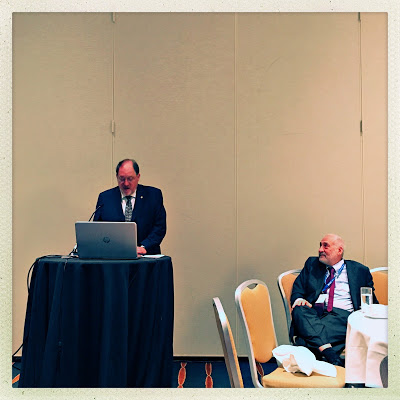Looking up to Galbraith The ASSA Meeting was this last weekend in Philadelphia. It was the bomb... cyclone (Nate Cline's joke; I'm sure many others too came up with that one). I don't have much to report actually. I did participate in one section, and will post a link to a preliminary version of my paper soon. I was at the Economists for Peace and Security (EPS) dinner, that honored Jamie Galbraith. This blog was named Naked Keynesianism, as you may know, because years ago Fox News accused him of teaching naked Keynesianism, and I thought that was both funny and a reasonable name for the stuff I did.Anwar Shaikh was at the dinner, and suggested that Jamie has one foot in each side of the heterodox/orthodox divide, as a result of his paternal influence (Richard Parker noted that as
Topics:
Matias Vernengo considers the following as important: Blanchard, Heterodox Economics, IMF, Mainstream, Natural Rate, Shaikh, Stiglitz
This could be interesting, too:
Matias Vernengo writes What is heterodox economics?
Matias Vernengo writes Milei’s Psycho Shock Therapy
Matias Vernengo writes IMF surcharges
Matias Vernengo writes Argentina on the verge
The ASSA Meeting was this last weekend in Philadelphia. It was the bomb... cyclone (Nate Cline's joke; I'm sure many others too came up with that one). I don't have much to report actually. I did participate in one section, and will post a link to a preliminary version of my paper soon. I was at the Economists for Peace and Security (EPS) dinner, that honored Jamie Galbraith. This blog was named Naked Keynesianism, as you may know, because years ago Fox News accused him of teaching naked Keynesianism, and I thought that was both funny and a reasonable name for the stuff I did.
Anwar Shaikh was at the dinner, and suggested that Jamie has one foot in each side of the heterodox/orthodox divide, as a result of his paternal influence (Richard Parker noted that as father/son duos come, the Galbraiths do much better than the Friedmans or Steins, and as well as the Gordons), and that for that reason at EPS (presided by Jamie for more than 20 years) we got accustomed to be less segregated from the rest of the profession. That seems about right.
And to prove Anwar right, Joseph Stiglitz was at hand to discuss Jamie's many achievements, and the many battles, including the one on Greece's debt crisis, and that is far from over, that he fought with Jamie.* Yet, while on policy issues there have been many battles that reasonable, and progressive mainstream Keynesians have fought with heterodox economists (a topic discussed here before), there are important differences between heterodox Keynesians, and their mainstream counterparts. For example, check Stiglitz's new paper on the last issue of the Oxford Review of Economic Policy (OREP).
He acknowledges that: "the economy does not quickly return to full employment," and that "simple models have been constructed investigating how structural transformation can lead to a persistent high level of unemployment, and how, even then, standard Keynesian policies can restore full employment, but by contrast, increasing wage flexibility can increase unemployment." That is essentially correct, and I should add, that perhaps Stiglitz has gone further than most mainstream economists pushing the need for the limits of what he refers to as equilibrium models (mostly of the Monetarist and New Classical/RBC type). But essentially his critiques derive from information problems and limits to rationality, coming from behavioral economics insights.

